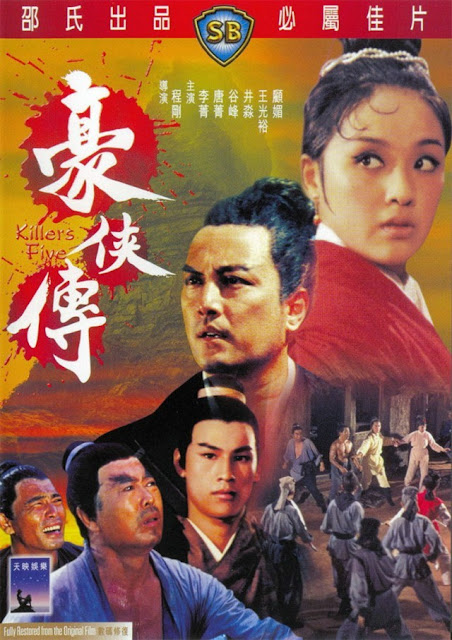DRAGON SWAMP (1969)
DRAGON SWAMP
(1969) is Runme Shaw's production of a fascinating fantasy / wuxia tale from
the fertile mind of director and script writer Lo Wei. Using the captivating
canvass of the Shaw Brothers beauty Cheng Pei Pei, Lo Wei and make-up artist
Fong Yuen add a wonderful dimension to what otherwise had been another
"they stole my magic sword" wuxia tale. Let's take a look.
The JADE DRAGON
SWORD is a coveted treasured sword from the Shangzhou Dynasty. Unfortunately,
after being used to murder an enlightened personage that was a reincarnation of
the holy Buddha it became cursed. Whoever attempts to own the sword is
possessed with a madness and their family is fated to be broken. The sword came
to be trusted to the Taoist Lingshan Chunyang Monastery.
Under the current
abbot, Master Fan Chung Yun, the Jade Dragon Sword was stolen by Tang Dachuan
the White-Faced General. Tang Dachuan seduced Master Fan's student Fan Ying, a
17-year-old impressionable young girl who betrayed everyone and everything she
knew for the "love and kindness" of the sweet-talking devil. Three
years and two children later (not to mention a certain Jade Dragon Sword) the
two lovers hiding place is discovered by Master Fan. Tang Dachuan escapes with
the older child and leaves behind Fan Ying and the younger child. Master Fan
recovers the Jade Dragon Sword and punishes Fan Ying to a twenty year
banishment in the Dragon Swamp but he takes the youngest child with him to raise in his
monastery.
20 years later, a
grown up Qing Erh practices the 8 diagram steps at the Jingang Pagoda unaware that she is being observed but when it is discovered that the Jade Dragon Sword has
once again been stolen Qing Erh suspects that she is the one responsible for
the thief's ability to walk the correct steps to get the sword. She sneaks out
of the monastery determined to reclaim the sword for her teacher and ask for
his forgiveness. It is not the sword, however, but her face that sets up the
incidents that become a fascinating adventure for the young girl and for us.
DRAGON SWAMP
(1969) has an all-star cast but Cheng Pei Pei owns this movie with a duel
performance as Fan Ying and her daughter Qing Erh. I have no idea why this
movie is not every bit the classic as Come Drink With Me (1966). She nails both
roles very convincingly. Director and scriptwriter Lo Wei plays the big good
Master Fan Chung Yu and Huang Chung-Hsin plays the big bad Tang Dachuan the
white-faced general. Yueh Hua is Roaming Knight Xi Zheng Yuan and Lo Lieh is
Head of Security Yu Chiang.
HONORABLE
MENTION: Sammo Hung Kam-Bo rises from extra to bit part as "gambler at Chiang's
party".
FIGHT TIME:
Sorry, but I found no one credited with the action direction for this film.
Although both Lee Siu-Pang and Han Ying-Chieh, (both capable action directors at
the time), are in this film neither one is credited anywhere as action directors for this movie.
That said, I counted are six (6) full fight scenes and I have learned that
that's plenty of action for this time period. The scenes are also pretty well
done but I have notice the debut of the concentric circles clock-counter-clock
stuntman-go-round that the extras do while waiting for their turn to die in
fight scenes and I can't help but smile.
HONORABLE
MENTION: As I mentioned before, Sammo Hung Kam-Bo rises from stuntman extra to
bit part as "gambler at Chiang's party".
As I said before, I have no idea why this movie is not more
well known. As famous as Cheng Pei Pei is, DRAGON SWAMP (1969) is a tour de
force of Cheng Pei Pei's acting skills as we see her in her 20's 40's and
looking like she is in her 60's. Fong
Yuen absolutely deserves another mention as the make-up artist and Lo Wei has
indeed whipped up another fascinating story but it is Cheng Pei Pei's acting
skills that sell her characters in all their different stages. Bravo to Cheng
Pei Pei for giving the Shaw Brothers another classic film that is also epic.
Yes, by all means, see it, buy it, borrow it but sorry, no stealing.
When people
summarily dismiss martial art movies from the 1960's, I understand. The level of
personal skills that Bruce Lee brought to the movie world raised the bar for
every single movie industry in existence. Yet, if you discard our history like
that, what of movies like this? We are not better off for not having seen this
movie. I am glad however to witness a movement to not only own these classics
but to watch them as well. I am also humbled to be able to do my part by
blogging these reviews. Good or bad, like or not, let's keep watching. See you
next time.
If you liked this review please comment on the blog, become a
follower of the blog, join me on my Facebook account by sending me a message
first and then a friend request so I know who I am friending (
https://www.facebook.com/Michael529P ) and like my Facebook page:
SHAW Brothers Kung Fu Movies 1965-1986. I thank you and would appreciate it
very much!
NEXT UP: THE FLYING DAGGER (1969)



























































